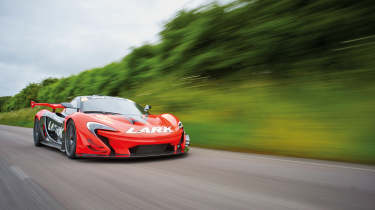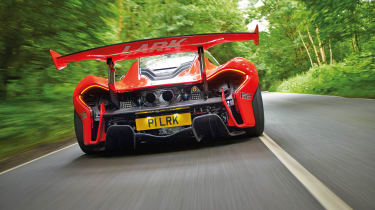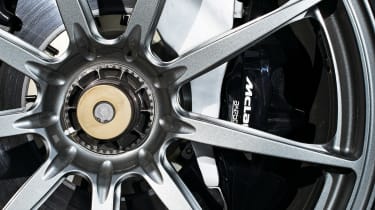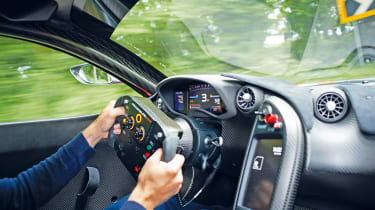McLaren P1 GTR review - we take to the streets in converted road-legal racer
Conversion to road-legal spec hasn't harmed the P1 GTR, and it's positively ferocious on the public highway
There’s a little gap in the traffic. Enough to pin the accelerator and hold it there all the way to the limiter in third. We’re heading home, day nearly done. Photographer Gus Gregory is checking the interior driving shots he’s just finished on the back of his Canon, but he hasn’t yet experienced the P1 GTR. No lag, the power comes in hard and without hesitation. I’ve caught Gus’s attention. At about 4500rpm the rear tyres light up for maybe a second before the traction control tempers the delivery just enough to restore traction. Then the fury ramps up again. Gus – a veteran of Veyrons and the like – is grabbing at fresh air, trying to restore his own grip on reality. ‘Oh my god… Oh my GOD… JETHRO!’ Then the familiar cackling as I flick into fourth and hit the brakes. ‘I’ve never felt anything like that,’ he says. ‘It shouldn’t be on the road. It just shouldn’t.’ He’s right, of course. Well, half right.
This car belongs to Andy Bruce, a man with impeccable taste in cars and a collection to make you jump for joy and then weep when you realise that you’ll never match it. Chassis 044 and road conversion 014, his GTR wears a distinctive Team Lark livery, which is a tribute to the Team Lark McLaren F1 GTR that contested the All Japan Grand Touring Car Championship in 1996. Why? Well Andy owns that, too. Of course he does. And it is also road-registered. Of course it is.
More reviews
When Gus and I arrive at Andy’s, the F1 GTR, tucked up beside the P1 GTR, could render pretty much any other car I can think of suddenly invisible. But not this one. It is outrageous in every detail. Walk around it (in a daze) and wherever you stop, the P1 GTR looks wildly exaggerated and sinister. It might wear a number plate, but the P1 GTR isn’t fooling anyone.
Engine, performance and 0-60 time
The P1 GTR was never intended to be a road car. Designed for track use only, the P1 GTR cost £1.98million – more than twice the price of a ‘regular’ P1 – has even more extreme aero (660kg at 150mph) and more power. The 3.8-litre twin-turbocharged V8 produces 789bhp and the electric motor contributes a further 197bhp for a total of 986bhp (or 1000 PS), as compared with the P1’s 903bhp.
At this level, performance figures are difficult to pin down, but a 0-62mph sprint is estimated at under 2.8 seconds. Top speed is a (limited!) 217mph.
Technical highlights
The GTR is wider, lower, 50kg lighter and more extreme in every way. McLaren Special Operations created just 45 P1 GTRs and, perhaps unsurprisingly, many of the owners liked the idea of popping to the shops in their new baby. Step forward Lanzante, a company with a rich history with McLaren that includes winning Le Mans with an F1 GTR in 1995. Clearly not a company to shy away from a challenge, Lanzante is now flat-out converting GTRs to road spec.
> Watch: McLaren F1 GTR on track
Lanzante’s road conversion for the P1 GTR is highly detailed, meticulously developed and infinitely adaptable to the owner’s taste. Many of the changes are dictated by simple legislation: catalytic converters for the exhausts, a handbrake, changes to the headlights, road-legal wheels and tyres. Others are for practical purposes, for example the increase in ride height and the retuned suspension rates.
However, Lanzante go beyond the minimum requirements and work on the minutiae, too. Andy Bruce’s car went back to the tub for the transformation and a huge amount of time was spent refining the interior trim. Andy wanted to keep the race-car feel but add sections of Alcantara and replace functional but slightly unrefined edges and seams with perfectly executed finishes. The result feels as beautifully flawless as you’d expect given the price of the GTR and the conversion.
What’s it like to drive?
Pull the driver’s door up and forward and the interior seems to float in a massive arc of polished carbon weave. The dash is simple, the elegant shapes formed from a cool satin-finish carbonfibre and sparingly trimmed in Alcantara. It’s not raw and ugly like, say, an F40, but there’s an economy about the architecture and it looks like a place of business. And then there’s the steering wheel. Modelled on the 2008 championship-winning MP4-23 F1 car’s, the chunky rectangular carbonfibre controller is a thing of real beauty and an extraordinary centrepiece to the driving environment. It’s actually tacky to the touch, almost like it’s coated in Blu-Tack. Driving gloves are never cool but this material is clearly designed for use with racing gloves, its gloopy texture feeling odd against bare skin. Fortunately, the width of the handles and the apertures that you wrap your fingers into feel utterly natural despite the alien shape.
There are 11 buttons and two three-position toggle switches to play with, but for now I just need the starter button. Push it twice to awaken the electrics, then press the brake pedal and stab the button one final time… The engine fires instantly, the electric motor taking the place of a conventional starter and creating a switch-like reaction. While you’re denied the time-honoured supercar drama of a high-pitched whizz followed by an evocative pause and then a big, tumbling explosion of cylinders, the P1 GTR makes up for it with a deep, booming idle that pours through the carbonfibre MonoCage. Yes, I could just go into E-mode, but time is short and there are 986 reasons that lead me to ignore that option.
Next I press the Active button to bring the toggle switches to life. They’re familiar from 12C, 650S, 675LT and P1, but rather than tuning the handling and powertrain respectively, here the left-hand switch simply controls the ESC settings and the right-hand one the Race Active Chassis Control setup. For today the suspension will stay in its least aggressive setting (the ride height, by the way, is fixed, unlike the road P1’s) and I’ll use the ESC’s base mode, with an exploratory few minutes in the more lenient one. ESC Off? Think that can wait for another day and a racetrack, don’t you?
The small but thick paddles are mounted on a central rocker just like in McLaren’s road cars. The paddle travel is perhaps longer than you’d expect but feels wonderfully mechanical in operation. There’s not much steering lock to play with but I manage to manoeuvre the GTR cleanly out onto a mini roundabout, thankful for the front lifting system that helps negotiate a steep angle of attack. It feels instantly and fabulously illegal.
The noise is quite extraordinary, an ever-changing series of chuffs, wheezes, sneezes and bone-jangling baritone roars. On a steady throttle the air pressure builds and builds with an intense hissing sound that grows ever more furious. It’s not tuneful, it’s not beautiful, but it is everywhere. Andy’s riding with me for these early miles and he shouts something with a smile. ‘What?’ I reply. Shouting louder he repeats: ‘It’s not too loud. In the F1 GTR you need to use cans and an intercom.’ I agree (with a nod, it’s easier) and chuckle that his frame of reference for what’s ‘loud’ is a car that competed at Le Mans.
The ride is harsh at low speeds and on some of the lanes near the Goodwood estate the GTR judders and jumps around. It tramlines too and suddenly the way the steering wheel has melted onto my palms seems rather reassuring. There’s no question a normal P1 – god that sounds ridiculous – would be more comfortable here and faster, too. Having said that, I’m wearing a grin as wide as the GTR’s rear wing. It feels absurd, wonderful, illicit and terrifying to bounce through West Sussex in this thing.
We find some slightly smoother tarmac and the GTR starts to flow. It’s still a hard-riding car, but the new 19-inch front and 20-inch rear centre-lock wheels stay in touch with the road, and the way it changes direction is startling. It feels a foot wider than the regular P1 (the front track is actually 80mm wider) and the rear melds instantaneous response with absolute stability, creating a sensation of the nose of the car being laser-guided by this hyper-alert rear axle. If you’ve ever driven a car with a dual-clutch ’box you’ll know the geeky delight of a rev counter needle that digitally snaps rather than sweeps between ratio changes. The GTR corners with the same precision and startling speed. You don’t feel the forces building, the tyres giving slightly and then biting. It just turns. Snap left, snap right, input and reaction locked together with titanium strength. I’ve not driven a road car with this level of agility. Ever.
The immediacy is amplified by the drivetrain. The 197bhp electric motor of the GTR might only be 20bhp stronger than the standard P1’s but it seems much better equipped to perform the torque-fill function. Be it in third gear at 4500rpm or sixth gear at 1500rpm, the GTR delivers instant acceleration and then just keeps on pushing you into the seat-back. It’s surreal, feeling the shot of electrical assistance helping even at low engine speeds in a higher gear. And if you downshift a couple of times and open the throttle the reaction is almost painfully brutal.
The swirling noise, the fluid blur of digits on the display, the rapidly ascending shift lights and the feeling of your leg being lifted away from the accelerator is genuinely shocking. Now add in the fact that even with the ESC fully engaged the rear tyres momentarily flare when the turbos hit full boost and you end up with a frenzied, panic-inducing free-falling quality to the performance. You do come to terms with the sheer scale of the relentless acceleration, but I’m not sure you’d ever fully get used to it. It makes the standard P1 feel almost tame.
So what happens when you try to combine the unearthly performance with the chassis’ intense agility? So much. A raging storm of turbo thunder and lightning (I can hear if not see the flames blasting from the tailpipes), your body on high alert as the drivetrain delivers all it can over and over, and the supreme Akebono brakes wiping away speed with bruising efficiency. The noise and sensations are something akin to being trampled in a riot, but what’s really amazing is that beneath all the volcanic fury, the GTR responds with such clarity and clinical precision.
Sometimes you might have to fight off the effects of the wide tyres and stiff suspension as the car hunts left and right on the brakes, and you always need to think carefully about unleashing the drivetrain on the exit of bumpy corners, but for the most part you find yourself just picking braking spots, turning in calmly and shaking your head in disbelief as the GTR responds without a millisecond of processing time. It simply does what you want at the instant you want it. Action and response as one. You don’t so much become immersed in what it’s doing as feel you’re picking the road apart all by yourself. Your forearms, hands and feet are integrated into the machine and the P1 GTR enacts every thought the moment it pops into your brain.
The problem with having this great power at your disposal is that roads are designed for the puny. They have speed limits and traffic lights. They have corners that require the weak to brake. And there’s nothing more annoying than hitting the DRS button, watching the rear wing flick flat in the side mirror and then another of these normal cars pulling out in front of you before you feel the benefit of the P1 GTR in low-drag configuration. ‘GET OUT OF THE WAY!’ you scream, internally at least. Then you remember that you are on the public road and, although you might temporarily have superpowers, you’ll be a mere mortal again when the key turns in a heavy cell door behind you. Restraint is a very big part of driving the P1 GTR on the road.
In fact, you might wonder what the point is of having a P1 GTR converted to road spec at all. It is patently too fast, too stiff, too loud and too low. I get that. I don’t dispute any of it for a second. But for these few sweet hours I couldn’t care less. Why? Because whether you’re doing 10mph, 100mph or no doubt 200mph, the P1 GTR is absolutely enthralling. It requires commitment, leaves your brain with no spare capacity. Your mind can’t wander back to the mundane. Did you lock the door behind you or send that crucial email? All that stuff evaporates. You’re just driving. For all of its complexity and vast potential, the P1 GTR offers a driving experience of absolute purity. It’s a drug and I’m an addict. Escapism comes no more immersive or spectacular than a P1 GTR with number plates.
Prices, specs and rivals
Lanzante won’t be drawn on the cost to convert a GTR, as each case is very different depending on where the car will be registered and the customer’s vision. Andy’s car is the 14th GTR converted for road use and there have been a couple more completed since. The base car – if you can lay your hands on one – will set you back a couple of million.
Rivals are few and far between. If you can lay your hands on one of the 38 Ferrari FXX K racers built, you’ll have a comparable car on the track. But a road-legal model? Ferrari has proved it’s possible, and converted a solitary car to road-legal spec. With deep enough pockets, it could be persuaded to repeat the act…









